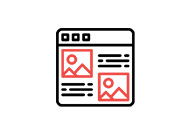We all know that producing content is a vital part of SEO. What is missed all too frequently is optimizing the content you are producing properly. To ensure you are not confusing your users or the search engines you need to make sure that you follow this SEO content optimization checklist.
Make Sure Your Title Tags Are Set
Title tags are the first thing that search engines see while crawling and indexing your website. It sets the tone for the whole page. Your titles should be the primary keyword you want to rank for first, followed by a secondary keyword, and then your brand or company name. This helps you rank for the keywords that you are trying to, while at the same time making sure you rank for your brand as well. Each page should have its own unique title and keep at 60 characters or less. Your title tag should look something like this: 
Targeted Keywords in the Body Text
Unique and relevant content is the name of the game. Since the Google Panda update, you couldn’t just flood each page with the keyword you wanted to rank for. It’s now important to create content around your keyword while only using it 2-3 times. The search engines might not pick up if the keyword is in your content randomly but your readers will. Take your time and make it look natural.
Headers
An H1 tag, or also referred to as a header tag can be thought of as the subject for your whole page. Your keyword phrase should be in your H1, but only once. H2’s can also be used on your pages if you have multiple sections on your page that have to do with your overall message you are trying to portray.
Internal Linking
When you think of link building, sometimes it’s only referred to when it comes to backlinks. Another part of link building that should not be overlooked on your website is internal link building. One of the things we know is Google loves content, and your users love being able to navigate a website with ease to the right pages. That is where internal linking comes into play. If you are writing content that supports one of your other pages, it makes sense to link to that page. You’re A, making it easier for your users to get to the right page, and B, showing Google you have extra content for your pages. Make sure you are using the correct anchor text when linking.
Image Alt Text
As search engines crawl and index pages, they can’t look at the photos as we would and know what it’s about. What you can do to improve your SEO, optimize the image, and add your keyword in the alt text or title. It can prove to be beneficial in image searches as well.
Easy to Read Content
If you are getting someone to your page or post, it would be foolish not to make it easier to read. This is not so much for the search engines, but if your content is not easy to read or understand, then your user could leave the page which negatively impacts your bounce rate. Bounce rate does affect your SEO. Make sure to always follow or have your SEO company this SEO content optimization checklist and have your content effectively work for you.


